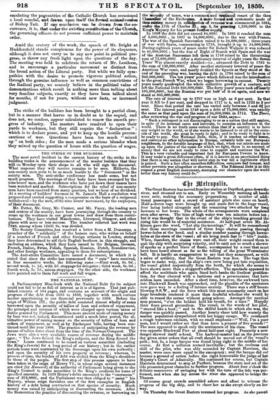THE NATIONAL DEBT.
A Parliamentary Blue-book with the National Debt for its subject could net fail to be as full of interest as it is of figures. That just pub- lished consists of 104 pages, and contains an account of the origin and progress of the debt from 1693 to 1858, together with much curious matter appertaining to our financial previously to 1693. Before the reign of William III., the public debt consisted almost wholly of sums borrowed upon the security of tallies of loan and orders of repayment., the principal and interest of which were charged upon various taxes or duties granted by Parliament. This more ancient mode of raising money by loan was not, indeed, discontinued until a much later period, the al- ternative power of raising money on the security of tallies of loan and orders of repayment, as well as by Exchequer bills, having been con- tinued until the year 1808. The practice of anticipating the revenue by means of tallies dates about from the time of the Norman Conquest. The Jews were also a very available source of revenue during the middle ages ; "The Jews fleeced the King's subjects, and the King fleeced the Jews." Loans continued to be raised on various securities (including the King's Jewels) for a long period of our history; but in the earlier periods loans were contracted by the Sovereign upon his own authority ; and upon the security of his own property or revenue ; whereas, in process of time, the burden of debt was shifted from the King's shoulders to those of the people. The first step of this process appears to have been taken in the reign of Henry VI., in whose reign several instances are cited (by Hansard) of the authority of Parliament being given to the Xing's Council to make securities to the King's creditors for loans of specified amounts. In 1450 Henry's debts amounted to the "enormous" sum of 372,0001., and the Parliament was then obliged to " assist " his Majesty, whose reign furnishes one of the first examples in English history of a debt being contracted on that species of security. Much money was raised by anticipating or discounting the revenues. After the Restoration the practice of discounting the revenue, or borrowing on the security of taxes, was a common and continual resort of the then Chancellor of the Exchequer. A mare formal and systematic mode of thus raising money in anticipation of revenue was commenced in 1664, under the 17th of Charles IL, cap. 1, far granting 1,250,0001. to the King's 'Majesty for his present further supply. In 1688 the debt did not exceed 84,888/. In 1691 it reached the sum of 3,000,0001.; in 1697 to 14,000,0001., due to the war with France. The war of the Spanish Succession raised it to 34,000,0001.; three years of war with Spain, commencing in 1718, brought it up to 64,000,000/. During eighteen years of peace under Sir Robert Walpole it was reduced to 46,000,000/. 'but the war of Right of Search with Spain and the war of the Auatriar; Succession left them in 1748 raised to the threatening sum of 75,000,0001. After a stationary interval of eight years the Seven Years' War edmost exactly doubled—i.e, advanced the Debt in 1763 to the sum of 130,000,000/. After another stationary interval of peace the American War came, and nearly doubled the figures as they stood at the end of the preceding war, leaving the debt in 1784 raised to the sum of 240,000,000/. The ten years' peace which followed was the introduction to the great French War, when we began borrowing in earnest. Twenty years nearly quadrupled the whole collective growth of a century, and left the National Debt 860,000,004)L The forty years' peace took off nearly 100,000,0001., but the Russian war put half of it on again, and now we stand at 805,000,0001.
The rate of interest up to 1707 was as high as 8 per cent. In that year it fell to 5 per cent, and dropped in 1717 to 4, and in 1722 to 3 per cent. Since that period the rate has varied only between 3 and 3i per cent. The interest paid in 1748 upon a debt of 75,000,0001. was exactly the same as that paid upon the sum of 34,000,0001. in 1713. The Times, after reviewing the rise and progress of our Debt, says- " Such a retrospect is not discouraging to us as a nation that still aspires, in spite of its internal cares and interests, to exercise an influence in the world. There is no truth more certain than that if a country is to have any weight in the world, or if she wants to be listened to at all in the coun- cils of the world, she must be ready to fight ; and to be ready to fight is to be ready to pay. Our National Debt, then, if it teaches no other lesson, and conveys no other information to Europe, certainly tells our European neighbours, in the forcible language of fact that, when our minds are made up upon the justice of the cause for which 'we fight, there is no amount of money that we are not ready to raise to support and continue the War. This is a very valuable and important fact for European Powers to know. It may make a great difference often, if it is known as an ascertained thing that there is one nation that will never stop in war till a legitimate object is gained. Such a fact often smoothes difficulties, conquers bad temper, and either prevents war altogether or shortens it. The National Debt is in this respect a great English monument, stamping our character upon the world better than any history could do."


























 Previous page
Previous page